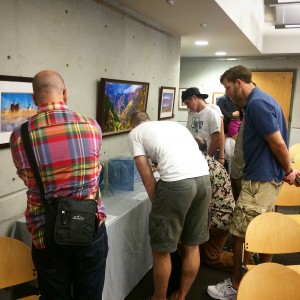
SALT LAKE CITY — Dozens of people gathered at the Seventh Annual Rumi Festival last week to enjoy poetry, art and music.
The Rumi Festival is hosted by the Rumi Poetry Club and held at the Anderson-Foothill Library in Salt Lake City. The club meets together once a year to recite favorite poems and parables of the 13th-century Persian poet Jalaluddin Rumi.
“2007 was the 800th anniversary of Rumi’s birth,” said Rasoul Shams, a speaker at the festival. “So we started these poetry-reading meetings here at the Foothill library.”
Rumi is considered an “inspiring voice for a life and culture based on love, peace, cooperation, good heart and open mind,” according to the festival’s website. The festival allows guests to experience Rumi’s philosophies through poetry, art and music.
Shams spoke on “The Seven Valleys of the Soul’s Journey” at the festival.
Shams was the English translator of the book “Rumi: The Art of Loving” and is currently working on translating other Persian works of literature. He described the common thread of love that runs through the book.
“Rumi’s path, if we want to use just one word to summarize his teachings, just one word, it is love,” Shams said in an interview after the event. “It’s very inclusive love; it comes from a deep realization of oneness. It comes from the sense of oneness, and we all come from the same source. We all have the same problems, the same needs, and we can do better than having conflicts and wasting our energy in a negative way.”
Creative, Islamic-inspired art was on display at the festival, created by BYU professor and glass artist Andrew Kosorok, who has been studying Islam for a number of years. He said he studied Islam from the perspective of how he would want someone to study LDS Christianity.
“I figured out very quickly that Islam is more like Christianity, from the perspective that there are hundreds of different branches, just a cascading rainbow of different branches of faith in Islam tradition,” Kosorok said in an interview after the event. “I was learning something directly contrary to popular media and public representation, just as learning about LDS Christianity is often very different than common media and public representation. I began to express that with the exploration of the 99 names, which is a tradition of 99 attributes of divinity.”

Kosorok explores the study of Islam through his art and is creating 99 stained-glass sculptures to represent the names of God from the tradition of the Quran. A few of the 99 pieces were on display at the festival.
“The 99 Names are sculptures that are an attempt at communicating what I learned through the vehicle of this tradition of 99 names,” Kosorok said. “I’m not trying to Christianize Islam, but I’m trying to explore Islam using the vocabulary I have.”
The Rumi Poetry Club meets once a month to discuss Rumi’s poems and parables. The club is free and open to the public. Visit rumipoetryclub.com for more information.




